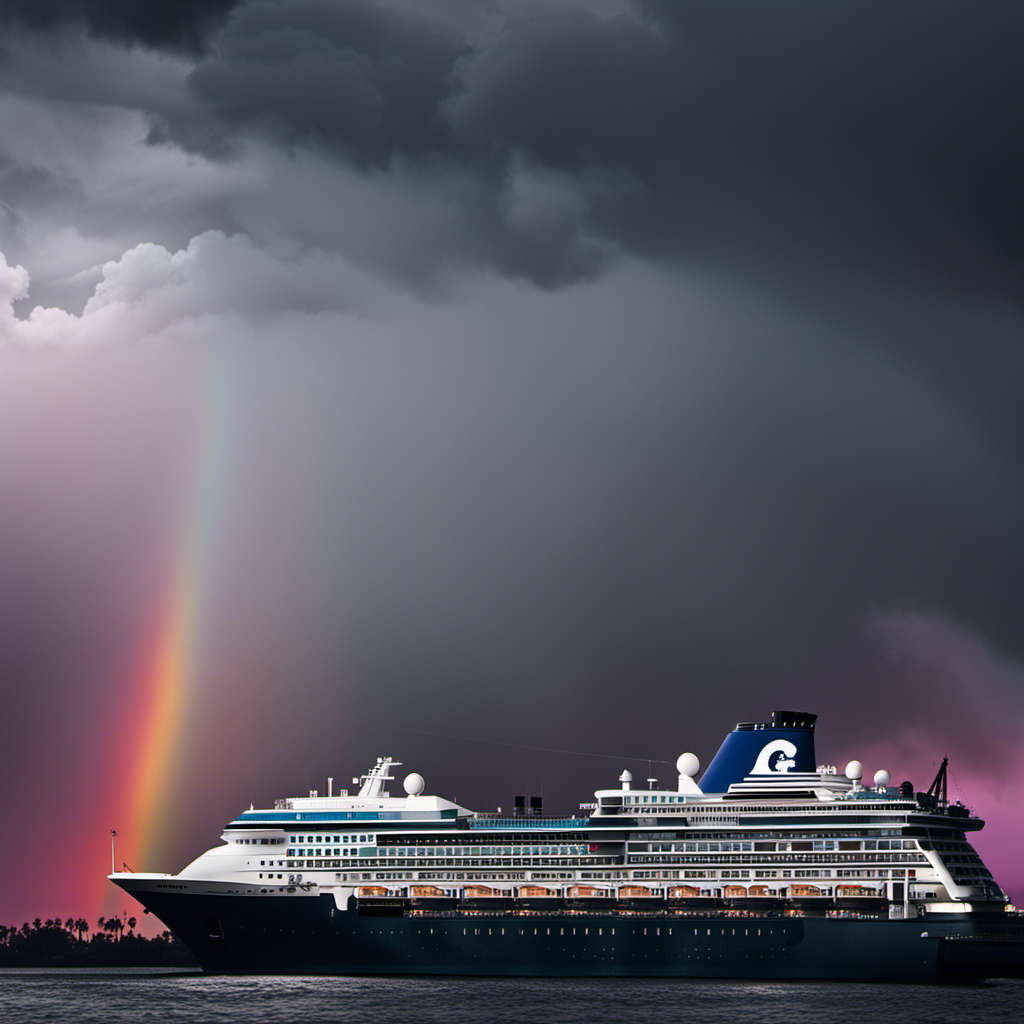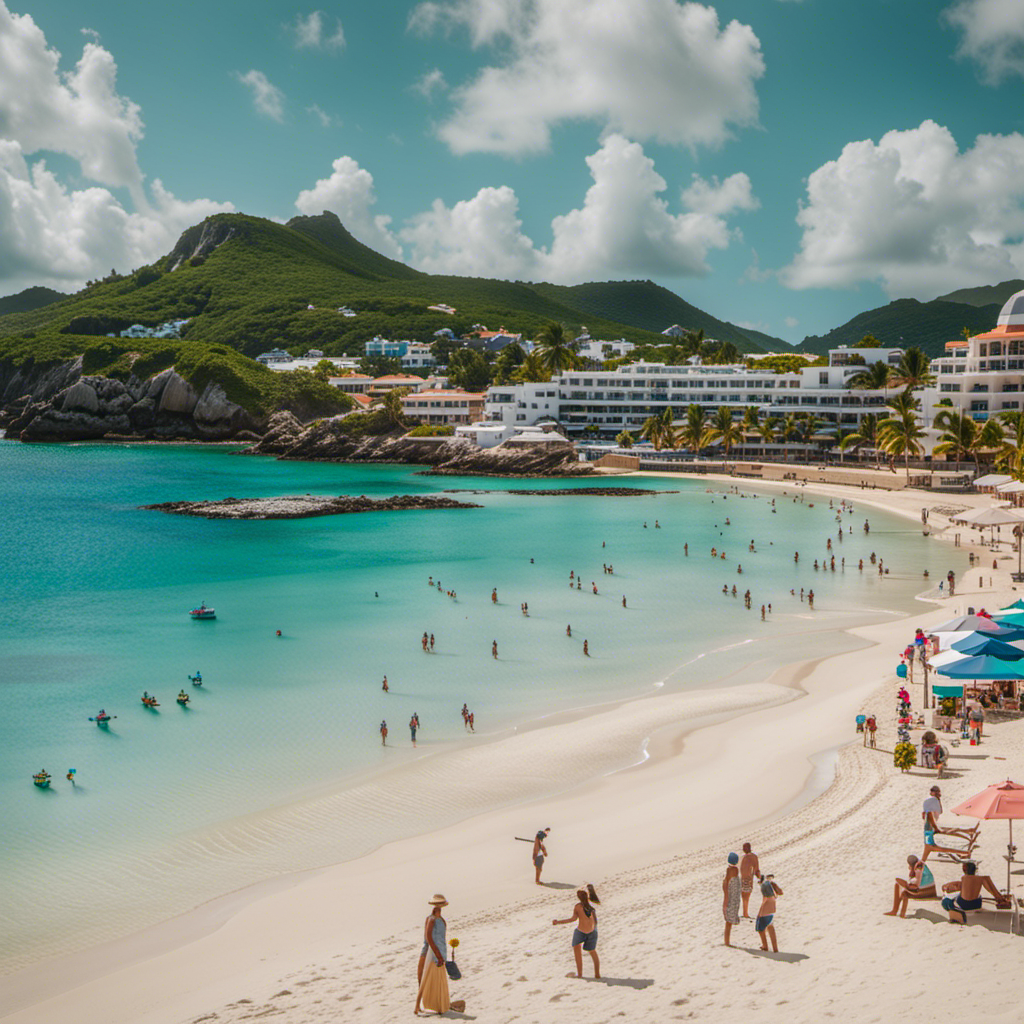Did you know that the CDC’s most recent voluntary program for cruise operators has caused significant debate among industry experts?
In an effort to combat the spread of Covid-19, the program introduces a color-coded system to identify cases on individual ships and requires cruise lines to meet certain criteria by February 18.
However, the Cruise Lines International Association (CLIA) argues that the program is discriminatory and not aligned with the actual public health conditions on cruise ships.
In this article, we will explore the controversy surrounding the program and its implications for the cruise industry.
Key Takeaways
- CDC has launched a voluntary program for cruise lines operating in the US, which includes a color-coded system to identify Covid-19 cases on individual ships.
- Cruise lines have until February 18 to opt into the program and are required to have response plans, port agreements, and testing of passengers and crew.
- The Cruise Lines International Association (CLIA) believes that the program is discriminatory and that CDC recommendations are out of step with the actual public health conditions on cruise ships.
- Celebrity Beyond, a new cruise ship, has successfully completed sea trials and is set to debut on April 27, featuring exclusive areas for suite guests, a fine-dining restaurant at sea, and innovative accommodations.
CDC’s Voluntary Program Overview
I think it’s important to understand the details of the CDC’s voluntary program for cruise ships. The program aims to enhance the safety of cruise ship operations during the ongoing pandemic. It provides guidelines and recommendations for cruise lines to follow in order to prevent the spread of Covid-19 on board. The program includes a color-coded system to identify Covid-19 cases on individual ships and specific requirements that cruise lines need to meet by February 18.
The CDC’s Voluntary Program requires cruise lines to have response plans, port agreements, and testing protocols in place. However, the program has sparked controversy within the industry. The Cruise Lines International Association (CLIA) has called the program discriminatory. They believe that the CDC’s recommendations are out of step with the actual public health conditions on cruise ships.
The cruise industry, including CLIA and its members, is committed to protecting passengers, crew, and the public. However, they believe that the CDC’s program may not be necessary given the industry’s record of commitment to safety.
Requirements and Criteria
The new color-coded system implemented by the CDC’s voluntary program for cruise ships identifies Covid-19 cases on individual ships and requires cruise lines to have response plans, port agreements, and testing of passengers and crew, among other criteria. The program has sparked industry controversy, with the Cruise Lines International Association (CLIA) calling it discriminatory. Cruise lines argue that the CDC’s recommendations are out of step with actual public health conditions on cruise ships. Despite these concerns, the cruise industry is committed to preventing the spread of COVID-19 and has a record of protecting passengers, crew, and the public. However, the implementation of the program may pose challenges for cruise lines. They have until February 18 to opt into the program and meet the requirements and criteria set by the CDC.
| Requirements and Criteria |
|---|
| – Response plans |
| – Port agreements |
| – Testing of passengers |
| – Testing of crew |
| – Color-coded system |
| – Other criteria |
Cruise Industry Response
Cruise lines are strongly opposed to the CDC’s recommendations, stating that they are not aligned with the actual health conditions onboard cruise ships. The cruise industry, represented by the Cruise Lines International Association (CLIA), has expressed concerns regarding the CDC’s program. They believe that the recommendations are discriminatory and do not accurately reflect the industry’s commitment to preventing the spread of COVID-19.
Cruise lines argue that the CDC’s requirements are out of step with the current public health conditions onboard their ships. They emphasize that the industry has a proven record of safeguarding passengers, crew, and the public.
The cruise lines are urging the CDC to reconsider its recommendations and work collaboratively with the industry to develop guidelines that are based on reliable data and reflect the realities of cruise ship operations.
Celebrity Beyond Sea Trials
Completing successful sea trials, Celebrity Beyond impresses with its innovative accommodations and exclusive amenities for suite guests.
Here are four reasons why the ship stands out:
-
Captain Kate McCue’s role: Overseeing the trials with her experienced crew of 50+, Captain Kate McCue ensures a smooth operation and showcases her expertise in navigating the seas.
-
Innovative accommodations: Celebrity Beyond introduces cutting-edge accommodations, providing passengers with a unique and luxurious experience. From spacious suites to state-of-the-art technology, the ship offers a range of innovative options to cater to different preferences.
-
Exclusive amenities for suite guests: The ship goes the extra mile to enhance the experience for suite guests. They can enjoy access to exclusive areas, including private lounges and dining venues, where they can relax and indulge in fine cuisine.
-
Debut on April 27: Passengers eagerly await the ship’s debut on April 27, when it will set sail from Southampton, England. With its impressive features and attention to detail, Celebrity Beyond promises to deliver an unforgettable voyage.
NCL’s Mask Policy Change
I wonder how NCL’s recent mask policy change will impact the overall cruise experience for passengers. With the new policy starting on March 1st, passengers sailing on Norwegian Cruise Line will no longer be required to wear masks indoors, except for a few exceptions. This change in policy has important implications for public health, as it potentially increases the risk of COVID-19 transmission on board. While NCL has implemented various health and safety protocols to mitigate the spread of the virus, the relaxation of mask rules may create challenges in maintaining a safe environment. Passengers who are sailing before March 1st will still be required to wear masks indoors, ensuring a gradual transition to the new policy. It will be interesting to see how this change will impact the passenger experience and whether it will affect their confidence in the cruise line’s ability to protect their health and safety.
| Implications for Public Health | Impact on Passenger Experience | NCL’s Mask Policy Change |
|---|---|---|
| Increased risk of COVID-19 transmission | Challenges in maintaining a safe environment | No masks required indoors starting March 1st |
| Gradual transition for passengers sailing before March 1st | Confidence in the cruise line’s ability to protect health and safety | Exceptions to the mask policy |
Carnival’s Covid-19 Recovery Policy
While Carnival Cruise Line has implemented a Covid-19 recovery policy allowing passengers to skip pre-cruise testing if they have recovered from the virus within 3 months of sailing, proof of recovery, no symptoms, and documentation from a healthcare provider are required.
This policy applies to both vaccinated and unvaccinated passengers. It is important to note that the recovery criteria must be met, including being at least 10 days past infection.
For vaccinated passengers, this policy can have implications as it provides an opportunity to skip the pre-cruise test, which may be a requirement for boarding. However, it is crucial to follow the guidelines set by Carnival Cruise Line and ensure that all necessary documents and criteria are met to ensure the safety of all passengers and prevent any potential spread of Covid-19 onboard the cruise ship.
Implications for Vaccinated and Unvaccinated Passengers
Now let’s discuss the implications for both vaccinated and unvaccinated passengers in light of Carnival’s Covid-19 recovery policy.
This policy allows passengers to skip the pre-cruise test if they have recovered from Covid-19 within three months of sailing, regardless of vaccination status. Proof of recovery, along with no symptoms and documentation from a healthcare provider, is required.
This new policy applies to both vaccinated and unvaccinated passengers, offering some flexibility for those who have recently recovered from the virus. For vaccinated passengers, this means they can enjoy a smoother boarding process without the need for additional testing. However, it’s important to note that travel restrictions and requirements may vary depending on the destination and local regulations.
These policies could have an impact on cruise bookings as passengers may feel more confident knowing there are options available if they have recently recovered from Covid-19.
Passengers can now enjoy a smoother boarding process if they have recently recovered from Covid-19, as Carnival Cruise Line allows them to skip the pre-cruise test within three months of sailing, regardless of vaccination status.
This new policy has several implications for the cruise industry and its public health measures:
-
Easing restrictions: By allowing recovered passengers to skip the pre-cruise test, Carnival Cruise Line is acknowledging that recent recovery from Covid-19 provides some level of immunity. This decision may contribute to a more relaxed atmosphere onboard, as vaccinated and unvaccinated passengers who have recovered can move freely without the need for additional testing.
-
Boosting confidence: The policy change may also boost passenger confidence in cruising. Knowing that the cruise line recognizes and accommodates those who have recovered from Covid-19 could encourage more individuals to book trips, leading to increased revenue for the industry.
-
Public health considerations: While the policy aims to streamline the boarding process, it is crucial to ensure that public health measures are not compromised. Carnival Cruise Line still requires proof of recovery, along with no symptoms and documentation from a healthcare provider. This helps to minimize the risk of transmission and maintain a safe environment for all passengers and crew.
Overall, Carnival Cruise Line’s decision to allow recovered passengers to skip the pre-cruise test has implications for the cruise industry and its public health measures. It may contribute to a smoother boarding process, boost passenger confidence, and prioritize public health considerations.
Frequently Asked Questions
How can cruise lines opt into the CDC’s voluntary program?
Cruise lines can opt into the CDC’s voluntary program by submitting their response plans, port agreements, and testing protocols by February 18. This program uses a color-coded system to identify Covid-19 cases on individual ships.
What are some specific requirements that cruise lines must meet to participate in the program?
To participate in the CDC’s voluntary program, cruise lines must meet specific requirements. These include developing response plans, securing port agreements, conducting passenger and crew testing, and implementing health and safety protocols.
Why does the Cruise Lines International Association (CLIA) believe the CDC program is discriminatory?
The Cruise Lines International Association (CLIA) believes the CDC program is discriminatory due to cruise lines’ concerns that the recommendations are out of step with actual public health conditions on cruise ships. CLIA emphasizes their commitment to preventing the spread of COVID-19 and protecting passengers, crew, and the public.
What are some unique features of the new cruise ship, Celebrity Beyond?
The new cruise ship, Celebrity Beyond, offers a range of unique features. These include an exclusive area for suite guests, a fine-dining restaurant at sea, and innovative accommodations. It is set to debut on April 27, sailing from Southampton, England.
How does NCL’s mask policy change differ for passengers sailing before and after March 1st?
NCL’s mask policy change for passengers sailing before March 1st requires them to wear masks indoors, with exceptions. However, starting March 1st, passengers sailing with NCL will not be required to wear masks indoors, as part of NCL’s passenger safety measures.
Conclusion
In conclusion, the CDC’s new voluntary program for cruise lines has sparked controversy within the industry.
While the program aims to identify and prevent the spread of Covid-19 on ships, the Cruise Lines International Association argues that the recommendations are discriminatory and not aligned with the actual public health conditions on cruise ships.
The industry believes they have a strong track record in protecting passengers and crew.
As the debate continues, it is clear that finding a balance between safety and industry recovery remains a challenge, leaving the future of cruising uncertain, like a ship navigating through stormy waters.










